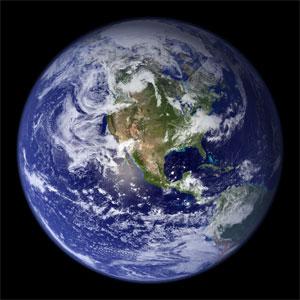Tuesday November, 25, 2014 at 01:52 AM
thank you



1 – Where does the Earth come from?
A very long time ago, a large cloud of dust around the sun started to turn very quickly. It started to gather and form large balls which formed planets among which, the earth.
2 - What is on Earth?
The Earth looks like a big fruit:
- The crust is made of hard stones whose temperature varies from 80°C to 50°C.
- The coat which is made of more tender rocks looks like the pulp of a fruit.
- The core is made of magma, i.e. of the molten rocks because in the centre of the earth, the temperature exceeds 6000°C.
We cannot go to the centre of planet Earch because at approximately 5 km of depth the temperature exceeds 150°C.
The rocks are different in the ground. There are eruptive rocks (volcano), sedimentary rocks (remains of animals, plants), and limestone (more tender).
3- Volcanoes.
The coat is composed of rocks in fusion (melted) –also called magma. The temperature exceeds 1300°C.
The magma goes up on the surface because it is under pressure: it is a volcanic eruption (violent explosion).
When it cools down it becomes hard again and thus forms volcanoes (opening in the earth's crust). They are composed of a tank (where the magma is), of a chimney (where the magma goes up) and of a crater (it is the hole on the surface of the ground).
In France, there are volcanoes: such as the Massif Central.
They are “deadened” i.e. they are not in activity; but they can awake one day and throw out lava.
4- Why does the earth move?
The surface of the earth is a large puzzle made up of enormous plates (12) which move all the time, very gently (a few centimetres per annum): they are the tectonic plates.
A very a long time ago, the continents did only one but as the plates moved they separated (faults) while others approached (mountains).
5- Mountains.
The mountains were born from movements of the earth's crust:
- The alpine range in Europe and the chain of the Himalayas in Asia are due to the meeting of two plates. The rocks yielded under the shock and rose up to 10000 m of altitude (chain of collision).
- The Rock Mountains in North America and the Andes in South America are the result of the meeting of two oceanic plates which plunge one under the other (chain of “subduction”).
- The mountains are not as big as they used to be because they wore out with erosion. It is due to the wind which takes along specks of sand which damage the rock; it is due to the water which destroys the tenderest rocks; and it is due to the frost which hardens the water and makes the rocks burst.
- The highest mountain is the Everest, in Asia. In Europe, the highest mountain is the Mont Blanc.
6- Plains.
Long ago, the ground was covered by the sea, but as it withdrew, it left sediments which accumulated to form very flat grounds called plains.
7- Oceans and seas.
The oceans occupy most of the surface of the earth: approximately the 70%.
From the biggest to the smallest, the oceans are:
- The Pacific Ocean which goes from America to Russia and China,
- The Atlantic Ocean which goes from France to America,
- The Indian Ocean
- The Arctic Ocean.
As for the seas, there are:
- The North Sea,
- The Mediterranean,
- The Black Sea,
- The Red Sea,
- The China Sea,
- The Caribbean Sea.
Their bottom is composed of relief as on the grounds.
8- Continents.
There are six continents. From the biggest to the smallest:
- Asia,
- America,
- Africa,
- The Antarctic,
- Europe
- Oceania.
6 vote(s) - Average rating 4.5/5
Tuesday November, 25, 2014 at 01:52 AM
thank you
Tuesday November, 25, 2014 at 01:43 AM
I love your website you just might need more info about things I am grateful for this website thank you to make this website it is good and worth a shot please make extra information thank you for letting everyone use this website bye bye
Tuesday November, 25, 2014 at 01:38 AM
good
Tuesday November, 25, 2014 at 01:38 AM
very good
Tuesday November, 25, 2014 at 01:36 AM
I love this website it has fun facts you might need a little more information about earth and other good things
Tuesday November, 25, 2014 at 01:34 AM
very good I love it good website